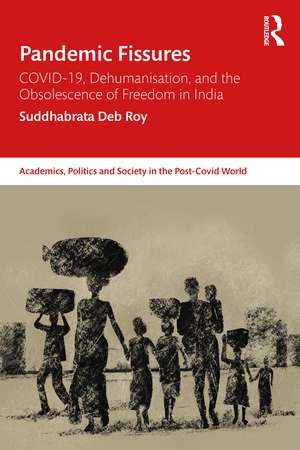Pandemic Fissures: COVID-19, Dehumanisation, and the Obsolescence of Freedom in India: Academics, Politics and Society in the Post-Covid World
Autor Suddhabrata Deb Royen Limba Engleză Hardback – 9 aug 2024
Part of the Academics, Politics and Society in the Post-COVID World series, the book will be an essential read for scholars and researchers of sociology, political studies, cultural studies, social anthropology, South Asia studies, pandemic studies, and postcolonial studies.
Preț: 954.20 lei
Preț vechi: 1163.65 lei
-18% Nou
Puncte Express: 1431
Preț estimativ în valută:
182.58€ • 191.15$ • 151.08£
182.58€ • 191.15$ • 151.08£
Carte tipărită la comandă
Livrare economică 05-19 aprilie
Preluare comenzi: 021 569.72.76
Specificații
ISBN-13: 9781032260709
ISBN-10: 103226070X
Pagini: 370
Dimensiuni: 156 x 234 mm
Greutate: 0.69 kg
Ediția:1
Editura: Taylor & Francis
Colecția Routledge India
Seria Academics, Politics and Society in the Post-Covid World
Locul publicării:Oxford, United Kingdom
ISBN-10: 103226070X
Pagini: 370
Dimensiuni: 156 x 234 mm
Greutate: 0.69 kg
Ediția:1
Editura: Taylor & Francis
Colecția Routledge India
Seria Academics, Politics and Society in the Post-Covid World
Locul publicării:Oxford, United Kingdom
Public țintă
PostgraduateRecenzii
“This manuscript covers both the pandemic from a Marxist angle and also explores some related issues in Marxist theory. As such, it is on the whole a good effort that demonstrates a grasp of many of the core issues, both in theory and in social reality. The topic is an important and compelling one that is in need of discussion, including for a global audience."
Kevin Anderson, Distinguished Professor of Sociology, University of California, USA.
"This manuscript deals with a critical issue that could hardly be more timely—the impact of the Covid-19 pandemic on India, and its overall social, political, and ideological consequences. The author has marshaled a considerable amount of data, reports, and information on India’s response to the pandemic, which will fill an important gap in the growing body of literature concerning the pandemic’s global impact. It also has the virtue of not limiting itself to an empirical analysis, drawing from a wide range of theoretical works in arguing that the pandemic highlights the need for an alternative to both neoliberal and statist models of development. The work has the potential to be an important addition to Routledge’s catalog of works on critical social theory."
Peter Hudis, Distinguished Professor, Humanities and Philosophy, Oakton College, USA.
Kevin Anderson, Distinguished Professor of Sociology, University of California, USA.
"This manuscript deals with a critical issue that could hardly be more timely—the impact of the Covid-19 pandemic on India, and its overall social, political, and ideological consequences. The author has marshaled a considerable amount of data, reports, and information on India’s response to the pandemic, which will fill an important gap in the growing body of literature concerning the pandemic’s global impact. It also has the virtue of not limiting itself to an empirical analysis, drawing from a wide range of theoretical works in arguing that the pandemic highlights the need for an alternative to both neoliberal and statist models of development. The work has the potential to be an important addition to Routledge’s catalog of works on critical social theory."
Peter Hudis, Distinguished Professor, Humanities and Philosophy, Oakton College, USA.
Cuprins
Acknowledgements x List of Abbreviations xi Introduction 1 1 India and the Unequal Pandemic 27 2 The Monstrosity of Disasters under Capitalism 67 3 Pandemics of Capitalism and Everyday Disasters 115 4 Benefits and Pitfalls of Local Governance during Apocalyptic Times 161 5 Radical Possibilities of the Apocalyptic Times 206 6 Morbidities of Disaster Civility 258 Conclusion 311 Index 345
Notă biografică
Suddhabrata Deb Roy is a PhD Candidate at the University of Otago, New Zealand.
Descriere
This book analyses India’s response to COVID-19, using an intersectional framework that highlights the roles of the central government, regional governments and community organisations, both formal and informal.



